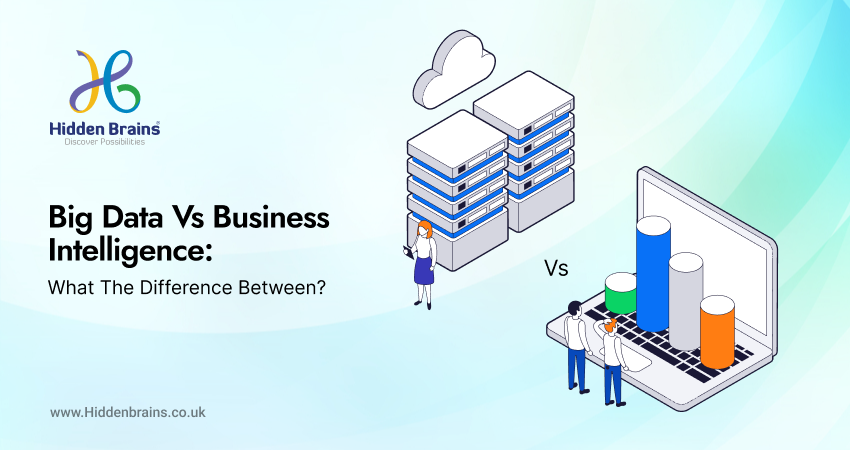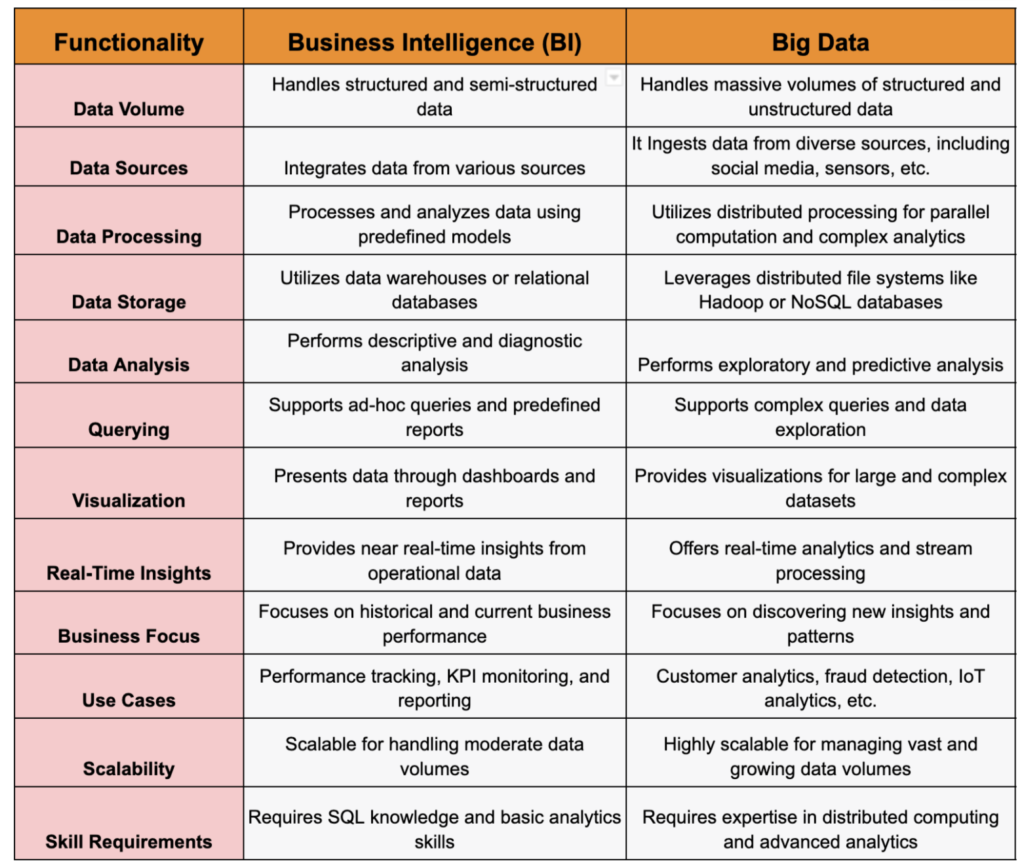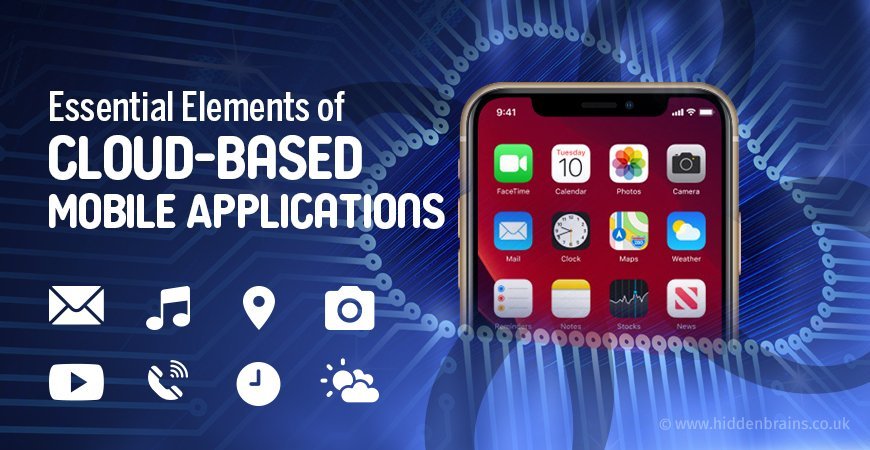
Keyphrase: Big Data Vs Business IntelligenceBig Data Vs Business Intelligence- which one should you choose?
Of course, it’s difficult to decide especially when you are not sure about the basics… So let’s get started from scratch…
In today’s fast-paced and interconnected world, data has become the lifeblood of businesses across industries. Every click, swipe, and transaction generates a wealth of information, providing valuable insights into consumer behavior, market trends, and operational efficiency.
As a result, the ability to effectively manage and harness this data has become really challenging. This has led to the emergence of powerful technologies and methodologies, such as big data and business intelligence, that enable organizations to extract meaningful value from the pool of information at their disposal.
If you are underestimating these technologies in managing the data, then you need to know the below-market share…
Market Statistics of Big Data and Business Intelligence
In this tech-driven world, big data and BI technologies are roaring to the next level and providing better opportunities to manage those data. Before you jump straight to make a decision to hire a software development company in the UK, you should know how these technologies are performing in the market.
- According to the market survey report, the global big data analytics market size was valued at $271.83 billion in 2022 which is projected to grow to $307.52 billion in 2023 and $745.15 billion by 2030.
- The global business intelligence market is worth $29.42 billion as of 2023 which will jump to $54.27 billion by 2030.
- The global rate of BI adoption is around 26% and 33% of large-sized businesses will make intelligence-driven decisions in 2023.
Knowing these statistics, it is clear enough that these technologies have a long way to go. But the central question that arises here is why there is an increasing demand for Big data and business intelligence.
The Challenges of Managing the Business Data
Million and zillions of people in the world are accessing the internet. Each and every action or movement they make on the internet actually generates new data. And businesses from across various industries want to use that data to track user behavior, customer information, tracking inventory, and more.
Apart from accessing this massive data, the real challenge is finding secure ways to store, analyze, and kept those trillions of gigabytes of data secure. In fact, the importance of data management technology has skyrocketed in recent years, driven by several factors.
So before we get into the details of choosing between Big Data Vs Business Intelligence, we should understand the various factors that influence the demand for big data and business intelligence in the market.
1. Hassle of Managing Sheer Volume of Data!
First and foremost, the sheer volume of data being generated is staggering. We are living in an era of exponential data growth, with petabytes and even zettabytes of information being produced daily.
This surge in data creation is fueled by the rise of digital platforms, social media, Internet of Things (IoT) devices, and other technological advancements that have made data generation an integral part of our daily lives.
2. Handling Data With Traditional Methods!
With the increasing among of data, the diversity and complexity of handling the data with manual procedures have also grown exponentially.
Traditional structured data from relational databases now coexist with unstructured and semi-structured data from sources like emails, social media posts, sensor readings, images, and videos.
This wealth of data variety presents both a challenge and an opportunity for organizations, as they must find ways to extract meaningful insights from a multitude of data types and formats.
3. Speed Really Matters In Sorting Data
Furthermore, the speed at which data is generated and processed has reached unprecedented levels. Real-time analytics has become a necessity for businesses to make timely decisions, respond to market changes, and gain a competitive edge. The ability to capture, process, and analyze data in near real-time has become a crucial requirement for organizations across industries.
In the midst of this data revolution, two key concepts have emerged as fundamental pillars for effective data management: BIG DATA and BUSINESS INTELLIGENCE.
With these challenges, you have got an idea that how Big Data and BI are taking the central stage in the business world. But when it comes to Big Data Vs Business Intelligence- what do you choose to manage the data?
Let’s get into the deep of Big Data and Business Intelligence- a detailed comparison between them.
Big Data Vs Business Intelligence: Understanding the Philosophy Behind
Big Data and Business Intelligence (BI) are two related concepts in the field of data analysis and decision-making, but they are not the same thing. Let’s explore each concept individually:
Big Data
Big Data refers to extremely large and complex data sets that cannot be easily managed, processed, or analyzed using traditional data processing methods. Big Data is characterized by the “3Vs”: Volume, Velocity, and Variety.
- Volume: Big Data involves a massive amount of data that exceeds the capacity of traditional database systems. This data can be generated from various sources, such as social media, sensors, transactions, and more.
- Velocity: Big Data is generated at a high speed and needs to be captured and processed in real-time or near-real-time to extract meaningful insights.
- Variety: Big Data comes in different forms, including structured data (like traditional databases), semi-structured data (like XML or JSON files), and unstructured data (like text, images, and videos).
Image Source: impactmybiz.com
Before you hire mobile developer in the UK, you need to understand that the main challenges of Big Data include storing, managing, processing, analyzing, and extracting valuable insights from these vast and diverse data sets. It requires specialized tools, technologies, and techniques to handle Big Data effectively, such as distributed computing, parallel processing, and advanced analytics.
Business Intelligence (BI)
Business Intelligence refers to the process of collecting, organizing, analyzing, and presenting data to support business decision-making. BI aims to transform raw data into meaningful and actionable insights, enabling organizations to make informed decisions, optimize performance, and gain a competitive advantage.
BI involves various activities and technologies, including data integration, data warehousing, data mining, reporting, and data visualization. It typically uses historical and current data from internal and external sources to generate reports, dashboards, and interactive visualizations that provide a comprehensive view of business operations.
The key features of Business Intelligence include:
- Data integration and aggregation: Gathering data from multiple sources and combining it into a centralized repository for analysis.
- Analysis and reporting: Exploring and examining data to uncover patterns, trends, and relationships, and presenting the findings in a structured format.
- Querying and ad hoc reporting: Allowing users to interact with data, ask specific questions, and generate custom reports.
- Data visualization: Representing data visually through charts, graphs, and dashboards to enhance understanding and facilitate decision-making.
In a nutshell, it is clear that Big Data focuses on the collection, storage, and processing of vast and diverse data sets, whereas Business Intelligence focuses on using data to derive insights and support decision-making.
While Big Data provides the raw material for analysis, Business Intelligence transforms that data into actionable information for business users.
Business Intelligence Vs Big Data: How They Are Different?
1. Big Data Vs Business Intelligence: Data Volume and Variety
Big Data: Big Data deals with extremely large and diverse data sets that exceed the capacity of traditional data processing systems. It involves data from various sources, including structured, semi-structured, and unstructured data.
BI: BI typically deals with structured data from internal systems, such as sales records, customer data, and financial data. While it can handle large volumes of data, it is not designed to handle the same scale and variety as Big Data.
2. Big Data Vs Business Intelligence: Data Processing
Big Data: Big Data requires specialized technologies like distributed computing frameworks (e.g., Hadoop) and NoSQL databases to process and analyze data in parallel across multiple nodes or clusters.
BI: BI uses traditional data processing techniques, such as relational databases and SQL queries, to process and analyze data. It primarily focuses on structured data and follows a more structured and predefined approach.
3. Big Data Vs Business Intelligence: Time Sensitivity
Big Data: Big Data processing often requires real-time or near-real-time analysis to extract insights and take immediate actions. It is crucial for use cases like fraud detection, sensor data analysis, and streaming data processing.
BI: BI processes historical and current data to provide insights into past and present trends. It is not primarily designed for real-time analysis but rather for periodic reporting and analysis.
4. Big Data Vs Business Intelligence: Purpose and Scope
Big Data: Big Data is focused on extracting valuable insights, identifying patterns, and discovering new correlations in large and complex data sets. Since, it aims to support strategic decision-making, drive innovation, and gain a competitive advantage, hiring dedicated developer in the UK is a worthy decision while building an enterprise app.
BI: BI is focused on providing insights and information to support operational and tactical decision-making within an organization. It aims to improve operational efficiency, monitor performance, and optimize business processes.
5. Big Data Vs Business Intelligence: Tools and Technologies
Big Data: Big Data relies on specialized tools and technologies like Hadoop, Spark, NoSQL databases, and machine learning algorithms for data processing, analysis, and modeling.
BI: BI uses tools like data warehouses, online analytical processing (OLAP), reporting tools, and data visualization platforms to aggregate, analyze, and present data in a user-friendly and interactive manner.
All in all, both Big Data and Business Intelligence are co-related to data analysis and decision-making, but they work differently in terms of data volume, variety, processing techniques, and the tools and technologies they employ.
Benefits of Using Business Intelligence and Its Different Stages
Though with the above comparison, you must be clear with the basic concept of Business Intelligence. But before you look for Business Intelligence and Big data services in the UK, you need to understand how BI helps your business to grow.
To make it learn, you need to get into the deep of its different stages that how it manages, discovers, analyzes, and warehouses the data…
Here is the below info-graphic giving you an idea that what activities businesses usually manage with BI and at what level. Apart, who are the major providers of cloud services…
Image Source: financesonline.com
5 Different Stages of Business Intelligence
Let’s learn how Business Intelligence work at the various stages and what level of data has been optimized.
Stage 1: Data Integration
Data integration involves gathering data from various sources, such as databases, spreadsheets, and external systems, and combining it into a unified view.
The benefits of data integration in BI include:
- Eliminating data silos: Integrating data from multiple sources helps break down information barriers and provides a holistic view of the business.
- Improved data accuracy: Integrating data reduces inconsistencies and errors that may arise from manual data handling.
- Enhanced data quality: Data integration allows organizations to implement data cleansing and transformation processes, ensuring high-quality data for analysis.
- Real-time data availability: Integrating data in real-time provides up-to-date information for decision-making, enabling timely responses to business needs.
Stage 2: Data Warehousing
Data warehousing involves storing large volumes of data in a centralized repository, optimized for analytical processing. Let’s check out how data warehousing works:
- Improved performance: Data warehouses are designed for analytical queries, providing faster response times compared to transactional databases.
- Scalability: Data warehouses can handle large data volumes and accommodate the growing needs of the organization.
- Historical analysis: Data warehouses store historical data, enabling trend analysis, identification of patterns, and long-term performance evaluation.
- Simplified data access: Data warehouses provide a structured and unified view of data, making it easier for business users to retrieve information without complex query construction.
With this stage of BI, you can easily and deeply optimize the data to understand what data do you need for further business processing.
Stage 3: Data Analysis
Data analysis involves applying statistical and analytical techniques to extract meaningful insights from the data. The benefits of data analysis in BI include:
- Decision support: Data analysis helps identify trends, patterns, and anomalies, empowering decision-makers to make informed choices.
- Predictive capabilities: By utilizing advanced analytics techniques, BI enables organizations to forecast future trends and outcomes.
- Competitive advantage: Analyzing data can reveal market insights, customer behavior, and opportunities, providing a competitive edge.
- Operational efficiency: Data analysis can highlight inefficiencies and bottlenecks, enabling process optimization and cost reduction.
Stage 4: Reporting and Visualization:
Reporting and visualization tools present data analysis results in a user-friendly and intuitive manner. The benefits of reporting and visualization in BI include:
- Improved understanding: Visualizing data through charts, graphs, and dashboards makes complex information more accessible and understandable.
- Interactive exploration: Users can drill down, filter, and manipulate data to gain deeper insights and explore different perspectives.
- Collaboration: Reporting and visualization tools facilitate sharing and collaboration, enabling stakeholders to align their understanding and make collective decisions.
- Real-time monitoring: Dashboards and alerts provide real-time visibility into key performance indicators, allowing prompt action when deviations occur.
Stage 5: Data Governance and Security
Data governance refers to the establishment of policies, processes, and controls to ensure data quality, integrity, and security. But what exactly includes in data governance and security in BI:
- Data consistency: Data governance ensures consistent definitions, standards, and rules for data across the organization, enhancing accuracy and reliability.
- Compliance: Implementing data governance helps organizations adhere to regulatory requirements and protect sensitive information.
- Risk mitigation: Robust security measures safeguard data against unauthorized access, ensuring confidentiality and integrity.
- Trust and credibility: Proper data governance builds trust in the data, enabling stakeholders to rely on it for decision-making.
So all in all, BI not just assists in optimizing and prioritizing the data for your organization, but also verifies its credibility to ensure data security.
However, before you make any decision to go with BI services to manage and organize data, it is worth knowing how Big Data can help businesses
Benefits of Big Data and How Does It Help Progressive Organizations?
If you are still underestimating the power of Big Data, then you need to know that the industry’s tech giants are already harnessing the power of big data. Apps like Netflix are using Big Data to analyze customer behavior and saving up to $1 billion and improving customer retention.
Here is a below graphic to understand the sneak peek of Big Data.
Image Source: financesonline.com
Business Intelligence Vs Big Data: What Are Their Main Functionalities?
If you are still confused about Business Intelligence and Big Data and not yet able to decide what technology will better help in your business, then consider the below infographic:

Image Source: hiddenbrains.co.uk
It’s worth noting that while there are some overlaps between BI and Big Data, they serve different purposes. BI primarily focuses on analyzing structured data to gain business insights and support decision-making. On the other hand, Big Data encompasses the processing and analysis of large and diverse datasets, including unstructured and semi-structured data, to uncover hidden patterns and trends.
Both BI and Big Data play crucial roles in helping organizations harness the power of data for their specific needs.
Conclusion:
Big Data Vs Business Intelligence: Which Has Better Future?
With this blog guide, we have tried putting things in a straightforward way without getting biased or inclining toward any particular technology. Both technologies are But the implementation of both technologies depends upon your business requirements and the complexity of the app. In that case, you can hire a mobile app development company in the UK. Since big data and business intelligence are complex technologies, you need to look for experts with the skills to handle their complexity.
And Hidden Brains UK is one of the leading software development companies in the UK that has a strong team of big data and Business intelligence experts and has the skills to understand project requirements. So if you have any app development requirements, then you can drop a query below.
FAQs
What is the difference between Big Data and Business Intelligence?
Big Data refers to large and diverse datasets that require specialized tools and techniques for processing and analysis. Business Intelligence (BI), on the other hand, is the process of collecting, analyzing, and presenting data to support business decision-making.
How do they handle data storage?
Business Intelligence often relies on data warehouses or relational databases for structured data storage. Big Data employs distributed file systems like Hadoop or NoSQL databases to handle the storage of large and diverse datasets.
What are some common use cases for Business Intelligence?
Business Intelligence is commonly used for performance tracking, KPI monitoring, financial reporting, and operational analytics.
What are some common use cases for Big Data?
Big Data is often used for customer analytics, fraud detection, sentiment analysis, IoT analytics, recommendation systems, and real-time analytics.
How do they contribute to organizational progress?
Business Intelligence helps organizations gain insights into their operations, improve decision-making, and enhance performance. Big Data enables organizations to unlock new opportunities, innovate, optimize operations, and gain a competitive edge through data-driven insights.
Do Not Forget To Visit Our Robust and Secure Services:
Mobile App Development Company in The UK | iOS App Development Company In the UK | Android App Development Company in the UK | Web Application Development Agency in the UK | PHP Development Company in the UK | ASP.NET Development Company in the UK | Hire Developers in the UK | Hire Best iPhone App Developers in the UK | Hire Android App Developers | Hire Web Developer in the UK | Hire PHP Developers In The UK | Hire ASP.NET Developers in the UK
Table of Contents





